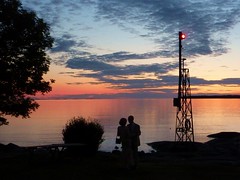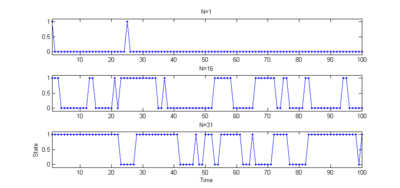July 29, 2013
Summer Silence
 Summer means many mailing lists and forums die. Here is a small model of what is going on:
Summer means many mailing lists and forums die. Here is a small model of what is going on:
When list members see activity they become more likely to post, maintaining activity. When there is no activity they often forget about the list, and have a much lower probability of posting anything (typically "Test: is this list dead?").
We can model this as N people, each with independent probability p of posting if they saw activity over the past day, and probability q << p of posting in the case of no activity.
This model also describes the "critical mass" problem of creating new forums - whether it is bootstrapping a big social network or just getting the researchers in a project to talk to each other online on the official forum.
A simple approach is to argue that N people will on average produce Np messages, and as long as Np>1 we will stay in a high activity state: each post is likely to trigger at least one post next day. As summer arrives N and p decreases due to holidays and laziness, and we cross the threshold in many forums to the low activity state, where the average number of posts is Nq. The time until such a post happens is around 1/Nq.
A slightly more ambitious model is to view it as a Markov chain with two states, "active", "inactive". The probability of no posts today if we are in the high activity state is (1-p)^N, and that moves us to the low activity state. We stay there as long as things are quiet, which has probability (1-q)^N. As long as q>0 this state is not absorbing, and eventually we go back to the active state. Writing out the other transitions results in a 2x2 state transition matrix, and one can use the standard textbook methods of solving it.
In particular, as shown here for this kind of simple 2x2 case we can do it by hand and get the probabilities as:
P(active) = (1-(1-q)^N)/(1-(1-q)^N+(1-p)^N)
P(inactive) = (1-p)^N/(1-(1-q)^N+(1-p)^N)
While the formulas are pretty messy, a plot makes things clear:

We get the transition point at 1-(1-q)^N=(1-p)^N (around 17 in this case). The transition is by no means sharp. Even smaller and quieter lists do have activity, it is just that on average it tends to end relatively quickly:
Plotting the required number of participants as a function of p and q gives us the following plot:
Note that you only need a very small group if people post a lot. Having people who add new stuff even with no prompting (high q) is just as good as having talkative people in the active state, in terms of maintaining critical mass.
However, the residence time in the active state behaves as a geometric distribution with expectation 1/(1-p)^N. The residence time in the quiet state has expectation 1/(1-(1-q)^N). The ratio of quiet time to talk time, (1-p)^N/(1-(1-q)^N) is not symmetric in p and q. It is more sensitive to q for small N: if you can boost the spontaneous posters, you make it more likely they will jumpstart the list out of a quiet state and then the normal posters will keep it up. For large N this is not often required, and increasing p is more effective in keeping the flow going.
So, the trick to end the summer silence and jumpstart small forums is to post something. And keep up doing that even if nobody responds the first time. On large forums that have gone quiet the problem is more likely that few want to say anything. That requires other methods.
July 25, 2013
My theory of pornography
 A Practical Ethics post on recent attempts to block pornography in the UK that leads to my own theory of why pornography in a wide sense is harmful - yet the harm is not the kind that should motivate heavy handed regulation.
A Practical Ethics post on recent attempts to block pornography in the UK that leads to my own theory of why pornography in a wide sense is harmful - yet the harm is not the kind that should motivate heavy handed regulation.
In between I get involved with art history, erotic furries, philosophy of pornograhy (Eric Schwitzgebel's version of Rule 34: "For All X, There's Philosophy of X") and the question how much pleasure hijacks the brain. It was a fun post to write. Not to mention research.
July 11, 2013
Festina Lente
 Stuart Armstrong has a post at Less Wrong about one conclusion from our joint paper about long-range colonization: if your goal is to reach as much resources as possible, it is more important to get fast spacecraft for big scale colonization than to start early.
Stuart Armstrong has a post at Less Wrong about one conclusion from our joint paper about long-range colonization: if your goal is to reach as much resources as possible, it is more important to get fast spacecraft for big scale colonization than to start early.
A million year delay that gives you a few percent more of lightspeed is really worthwhile. This works well together with Nick Bostrom's argument in his Astronomical Waste paper where he points out that reducing the risk of going extinct before collecting all the resources and whatever value they embody also is a good motivation for slowing down, if it reduces risk.
Of course, given that existential risk currently is increased because we are all on the same planet, this is not an argument to slow space colonization. Just to slow the big grab of the universe until we can do it really well.
July 08, 2013
Why SETI matters to the FHI
 (A little blurb I wrote for the institute homepage:)
(A little blurb I wrote for the institute homepage:)
Recently I participated in the first meeting of the UK SETI Research Network, an association of UK scientists devoted to looking for extra-terrestrial intelligence. The meeting got plenty of media coverage and might be the start of some exciting interdisciplinary work.
But why is the FHI interested in looking for aliens? Isn't it the Future of *Humanity* institute?
The reason is that the question about extra-terrestrial life and intelligence has a great deal of bearing on our own future.
If the universe had been full of alien intelligences we would have been able to look at the skies and learn something about what was technologically possible, what risks there were, how long civilizations survived and what they developed into. Instead we see a great silence.
Maybe the explanation is that we simply have not looked hard enough or in the right places. But it is likely that whatever the answer to the Fermi question "where are they?" implies something strange and important:
-
If we are alone in the universe, we have a huge moral responsibility. We can spread and fill it with life and consciousness... or fail, leaving the universe empty and meaningless without observers.
Why we are alone also matters. If we are alone because life or intelligence is hugely unlikely, we are the lucky winners of a vast lottery - lucky, yet not special, since our existence as observers requires success at least somewhere. Otherwise we would not be around.
But if we are alone because intelligence easily goes extinct, then we are in danger. Whatever the danger is, we need to understand it and find a way of escaping it. Which, given the lack of aliens, may be very hard.
If there are aliens but they all for some reason behave in the same way - never leaving their planets, evolving to dense computational objects in the galactic halo, hiding from each other, or hiding themselves from us - then that is a strange and fascinating fact about the fate of civilizations. What cultural forces could be so strong that any species, no matter its origin and alienness, will follow the same trajectory? And is it a desirable one?
Maybe there are fundamental technological limits on what we and any aliens can do, forever keeping us apart. Again, understanding what those limits are would tell us important things about our own future.
This brief list of possibilities shows that the question of alien life and intelligence does impact our questions about the future of humanity. The silent sky is in a way loudly telling us *something*. We just need to understand what the language is.

